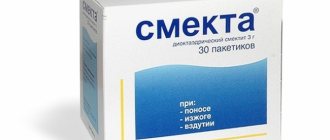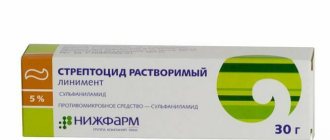Pharmacotherapeutic effectiveness of the drug
Polysorb is a sorbent of inorganic origin. Its active component is not selective and is capable of sorbing substances of different classes, resulting in a detoxification and sorption effect.
When used, various chemical substances that have a toxic effect on the body are bound and removed, regardless of where they came from or began to form in the body (for example, bacteria, viruses and fungi, toxins, foreign antibodies, poisons, medicinal substances, metal salts, alcohol, etc.).
Patients often have a question: is it possible to take polysorb for pancreatitis or not? In addition to all of the above, Polysorb binds those substances and metabolic products that begin to be produced by the body when food is ingested. These endogenous substances lead to the development of intoxication and severe pathological conditions. Therefore, doctors recommend using Polysorb for gastrointestinal diseases and poisoning.
Sorbent is contraindicated
Despite the safety and environmental friendliness of Polysorb, this sorption powder still has a number of contraindications for use.
- Polysorb is not recommended for patients with a history of erosive lesions of the gastrointestinal tract (peptic ulcers, ulcerative colitis).
- This sorbent is also prohibited for patients who periodically suffer from bleeding of various etiologies in the digestive system.
- Intestinal obstruction is also considered a contributing factor to the prohibition of the treatment of constipation with Polysorb.
- For those patients diagnosed with individual intolerance to sorbents, treatment of constipation with Polysorb is contraindicated.
Experts recommend that before deciding to take any enterosorbent for therapeutic or prophylactic purposes, you should definitely consult a doctor about the feasibility and admissibility of such therapy.
Indications for use
Experts recommend using Polysorb for pancreatitis in various intoxication conditions, for example, poisoning, viral infections, allergies, dermatoses, scaly lichen, as well as jaundice, hepatitis and renal failure.
Indications for use of the drug are as follows:
- general intoxication of the body;
- intestinal infectious pathologies;
- stomach upsets;
- purulent-septic rashes;
- poisoning;
- allergic reactions;
- renal failure.
We recommend that you read: How to get rid of flatulence due to pancreatitis.
Composition and release form
The drug Polysorb is produced only in powder form.
There are no tablets, capsules or pills. There are no other ingredients contained in this medicine.
https://www.youtube.com/watch?v=NmoZFP0kCYk
Appearance of the drug Polysorb: white powder with a slight blue tint.
The medicine has no smell. After stirring Polysorb, the water becomes white and slightly cloudy.
The drug belongs to the group of sorbents that are aimed at removing poisonous and toxic substances from the body. At the same time, Polysorb has a wide spectrum of action due to the content of a powerful sorbent - colloidal silicon dioxide.
The drug is available in only one form, namely in the form of a powder, which must be dissolved in water and taken orally. The first positive result occurs within a few minutes after taking the product.
Practicing gastroenterologist. Work experience: 9 years in a private clinic. If you haven't found the answer to your question, ask the author!
Currently, this absorbent is available only in the form of powder for suspension. For ease of use, the powder is produced in 2-layer 3-gram plastic bags (single dosage for adults) and in plastic jars of 12, 25, 50 grams.
Polysorb contains only colloidal silicon dioxide (active (sorbing) substance). Externally, Polysorb looks like a white powder with a bluish tint. The powder is odorless. When stirred in water, a white suspension is obtained.
Methods of use
For pancreatitis
The highly effective sorbent Polysorb is not included in the basic therapy of acute or chronic pancreatitis. However, some positive pharmacological effects of the drug allow it to be used for pancreatic pathology.
In the treatment of pancreatitis, Polysorb can provide:
1. Detoxification effect by reducing the level of proteolytic and liver enzymes (ALT, AST) in the patient’s blood.
2. Anti-inflammatory effect by binding and removing certain cytokines and tissue breakdown products.
3. Antidiarrheal effect by reducing the release of fluid into the intestinal lumen.
Thus, Polysorb is not a remedy that “heals” the pancreas. However, it successfully relieves some unpleasant symptoms.
The drug can be used in the form of a ready-made suspension, which is immediately taken orally.
The process of preparing the suspension is as follows: add 2-3 tablespoons of powder to half a glass of water (1 tablespoon = 2.5-3 grams of substance).
The maximum permissible dosage per day for adults is twenty grams (100-200 milligrams per kilogram of body weight). The daily dosage should be divided into several doses.
The drug should be taken before meals or an hour before taking other medications. If a patient needs to relieve a food allergy, the suspension should be used with meals.
The course of therapy directly depends on the severity of the disease. As a rule, for acute intoxication conditions, the drug can be taken for three to five days, for chronic intoxication – from ten to fourteen days.
For gastritis
Acute infectious gastritis often spreads to the small and large intestines (enterocolitis), which is manifested by vomiting, loose stools, abdominal pain and fever. Due to its ability to remove pathogenic bacteria and toxins from the human gastrointestinal tract, Polysorb is quite often prescribed for intestinal infections with symptoms of gastroenteritis.
The sorbent is part of complex therapy and is taken separately from other drugs with an interval of 2-3 hours. The simultaneous (at the same time) use of Polysorb with antibiotics or probiotics is unacceptable, since in addition to toxins, it will also bind to the active ingredients of these drugs.
The medication is practically not used in the treatment of chronic gastritis. In some cases, it is part of the treatment of certain conditions accompanying gastritis (for example, dysbiosis).
For heartburn
In this case, the prescription of Polysorb is justified only in the presence of duodenogastric reflux - when a large amount of bile and pancreatic juice enters the lumen of the stomach and esophagus. Because the
The sorbent removes excess of these fluids from the body, reduces intoxication, and will help eliminate the unpleasant symptoms of reflux.
At the same time, the main point of application of the drug is the intestinal tube and, to a lesser extent, the stomach. Polysorb is not included in the treatment protocols for gastroreflux disease, where preference is given to prokinetics, antacids and sedatives.
For stomach pain
Painful sensations in the stomach can be caused by banal overeating, exacerbation of chronic gastroduodenitis or peptic ulcer. Polysorb does not in any way affect the listed conditions and does not have analgesic effects. Therefore, its use for pain in the stomach is not justified.
The pain is relieved by following dietary recommendations and treating the underlying disease. In some cases, antispasmodic drugs are used that reduce the increased tone of the muscle wall of the stomach. Sorbents are used only for acute food poisoning, which is also accompanied by abdominal pain, but does not affect this symptom in any way.
How to take Polysorb for a cold?
Depending on the age and weight of the patient, different amounts of sorbent are required for treatment. An insufficient volume of sorbent will be less effective; an excess can lead to constipation, especially in children. Therefore, it is advisable to follow the prescribed dosages as accurately as possible, and, if necessary, choose Polysorb in packages designed for one-time use - for convenience.
In addition to water, the drug can be diluted in juice, breast milk, jelly, compote - for children this option would be preferable.
If the doctor prescribes the exact amount of the drug in grams, it is worth remembering that 1 heaped teaspoon contains 1 gram of Polysorb in dry form.
Operating principle
Take the medicine orally, first dilute it in a sufficient amount of water. Given its powdery nature, the product easily dissolves to a homogeneous consistency that is odorless and tasteless. This property of the drug allows Polysorb to be taken for constipation in children, and not only in adult patients.
Operating principle of the sorbent:
- After entering the stomach, the powder actively collects harmful and toxic substances;
- Having penetrated the intestines, the drug attracts toxins, allergens, bacterial agents and provoking viruses;
- Collects fatty components and excess cholesterol, absorbs breakdown products.
With constipation, the intestinal flora contains a large amount of pyogenic products caused by the accumulation of feces. Powder - sorbent attracts them, collects them and promotes rapid removal naturally along with stagnant accumulations.
Polysorb sorbent, when entering the body, acts as follows:
- The active components attract harmful substances and quickly remove them from the body.
- The active substance neutralizes the activity of pathogenic viruses and bacteria, which leads to normalization of the balance of beneficial microorganisms in the stomach. Ultimately, the smooth functioning of the digestive tract is restored, and unpleasant symptoms such as constipation, heaviness in the stomach, flatulence or diarrhea are eliminated.
- Normalizes blood cholesterol levels.
- Accelerates the removal of excess fat deposits.
So, while taking Polysorb, the body is completely cleansed of toxins, toxic and chemical substances, waste and pathogenic bacteria.
Cautions
Polysorb for constipation most often has positive reviews, since with proper treatment it not only eliminates the problem with bowel movements, but also does not cause addiction, which often happens with laxatives.
Contraindications:
- rectal and stomach bleeding;
- intolerance to polysorb;
- exacerbation of duodenal and gastric ulcers;
- intestinal atony.
In addition, if there are errors in therapy, constipation often occurs after Polysorb. This is due to excess fluid in the body. Therefore, when treating with silicon dioxide, you need to drink enough water per day.
Analogs
Experts point out that there is no sorption drug completely identical to Polysorb: there are analogues that are as close as possible in effect.
Enetrosgel is considered to be the closest in therapeutic principle; it is this sorbent that has the same indications and contraindications as Polysorb.
In addition, the following have a similar effect:
- Enterosorb and Smecta;
- Neosmectin and Diosmectin;
- Enterodes and Enterumin.
When deciding which sorbent is best to take, you should take into account the doctor's recommendations. If a specialist has prescribed Polysorb for constipation in adults, the prescription should not be ignored and it is not recommended to look for a replacement on your own.
Doctors' opinion
To ensure the effectiveness of using Polysorb for influenza in children and adults, here are reviews from experts:
- Anna “Any cold, even its mildest form, is accompanied by toxic damage to the body. In this condition, the patient may experience fever, abdominal pain, nausea and other unpleasant symptoms. It is with them that the drug Polysorb will help fight. As a therapist, I strongly recommend that my patients take this medicine as an adjuvant therapy. It is well tolerated and has virtually no side effects.”
- Daria “As a pediatrician, I know for sure that children are always more difficult to tolerate the flu due to the increased influence of toxins on their body. Moreover, it is young children who most often experience complications from colds, so they need to be treated very carefully. Along with antipyretic and mucolytic drugs, I advise my patients, including children, to take Polysorb. This medicine will simplify the course of influenza and ARVI and make the symptoms less severe.”
- Ruslan “Polysorb can be used to alleviate the patient’s condition with viral colds and flu. It is especially well received when a person is treated with it in combination with taking antiviral medications. I also don’t see any prohibitions on prescribing this drug during pregnancy, so I always prescribe it to women who have a cold during pregnancy.”











